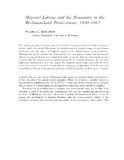| dc.contributor.author | Morapedi, W.G. | |
| dc.date.accessioned | 2009-12-10T09:43:34Z | |
| dc.date.available | 2009-12-10T09:43:34Z | |
| dc.date.issued | 1999 | |
| dc.identifier.citation | Morapedi, W.G. (1999) Migrant labour and the Peasantry in the Bechuanaland Protectorate, 1930-1965, Journal of Southern African Studies, vol. 25, No. 2, pp. 197-214 | en_US |
| dc.identifier.issn | 0305-7070 | |
| dc.identifier.uri | http://hdl.handle.net/10311/420 | |
| dc.description.abstract | This article grapples with issues that have largely remained outside the realms of migrant
labour studies in colonial Botswana: the positive input of migrant wages to agricultural
production and the effects of migrant wages on the differentiation of the peasantry.
Although this article endorses the conventional view that migrant labour had detrimental
effects on crop production and animal husbandry, it departs from previous studies in that
it argues that the extent to which migrant labour led to `underdevelopment’ has not been
suf® ciently demonstrated. It is also argued that migrant labour made it possible for those
at the lower level of society to rise through the emerging strati® cations of the Tswana, and
contributed positively to the general economies of the peasantries in Botswana’ s reserves | en_US |
| dc.language.iso | en | en_US |
| dc.publisher | Taylor & Francis | en_US |
| dc.subject | Migrant labour and peasantry and Bechuanaland | en_US |
| dc.title | Migrant labour and the Peasantry in the Bechuanaland Protectorate, 1930-1965 | en_US |

